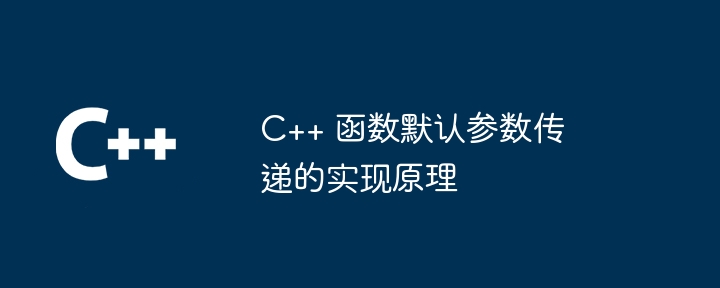Home >Backend Development >C++ >Implementation principle of default parameter passing in C++ functions
Implementation principle of default parameter passing in C++ functions
- WBOYWBOYWBOYWBOYWBOYWBOYWBOYWBOYWBOYWBOYWBOYWBOYWBOriginal
- 2024-04-19 13:48:021221browse
C The implementation principle of function default parameter passing: parse the function declaration at compile time and allocate memory units to store default parameter values. When the function is called, the existence of the actual parameter is checked: if it exists, the passed value is used; otherwise, the default parameter value is used. On the x86 architecture, default parameters are usually stored in registers and pushed onto the stack when the function is called; the actual parameter values override the default values.

C Implementation principle of function default parameter passing
Background
C Allowed Functions use default parameter values, which simplifies function calls and provides flexibility. This article will explore the behind-the-scenes implementation of default parameter passing in C functions.
Compile-time parsing
During the compilation phase, the compiler parses the declaration of the function and checks whether there are default parameters. If there are default parameters, the compiler allocates memory locations to store these parameter values.
Function call
When a function is called, the compiler checks whether there are actual parameters. If an actual parameter is present, the value passed in is used; otherwise, the default parameter value is used.
Register Storage
In x86 architecture, default parameters are usually stored in registers. When the function is called, the values of these registers are pushed onto the stack. If an actual parameter is provided in the call, the parameter value overrides the default value in the register.
Code Demonstration
The following code demonstrates the implementation principle of default parameter passing in C:
#include <iostream>
using namespace std;
void printSum(int a, int b = 10) {
cout << "a = " << a << ", b = " << b << endl;
}
int main() {
// 使用默认参数
printSum(5);
// 使用实参覆盖默认参数
printSum(5, 20);
return 0;
}Output
a = 5, b = 10 a = 5, b = 20
Conclusion
C function default parameter passing is achieved through compile-time parsing and checking the existence of actual parameters when the function is called. Default parameter values are stored in registers and can be overridden by passed arguments. This mechanism improves code readability and flexibility.
The above is the detailed content of Implementation principle of default parameter passing in C++ functions. For more information, please follow other related articles on the PHP Chinese website!

